#this isnt about Hezbollah
Explore tagged Tumblr posts
Text
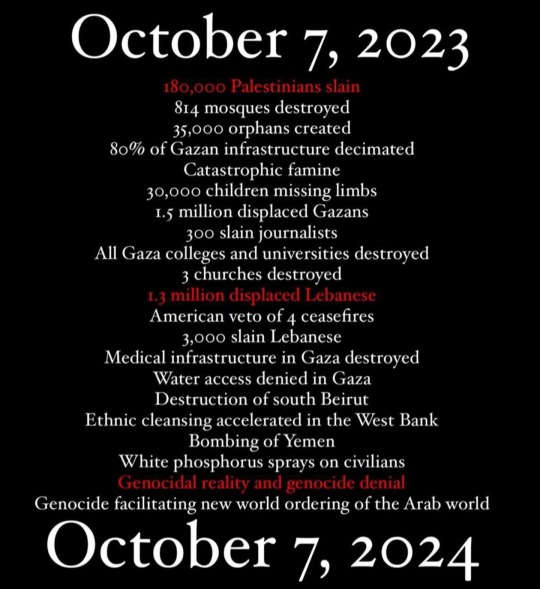
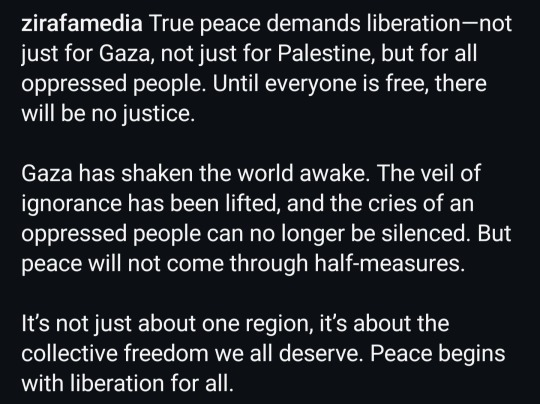
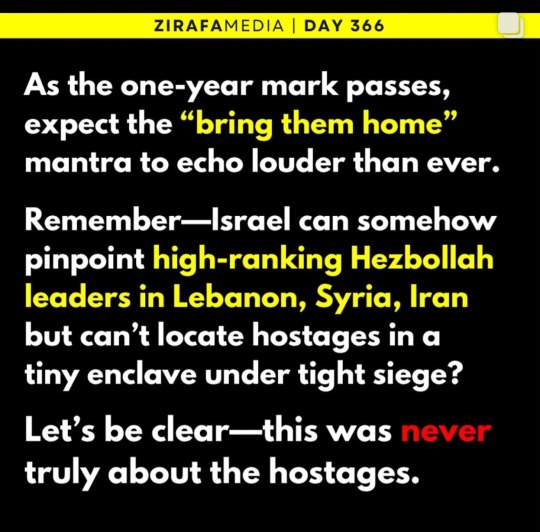
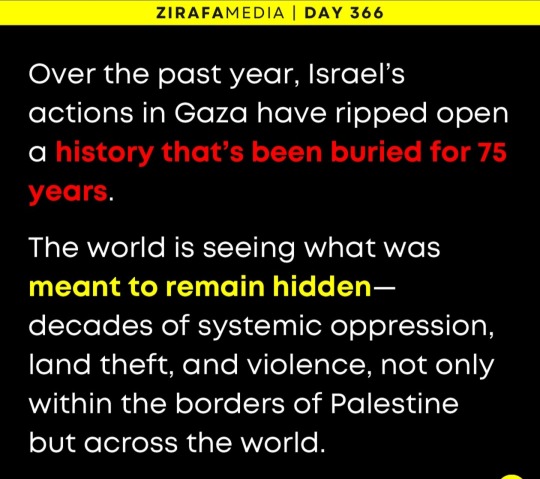
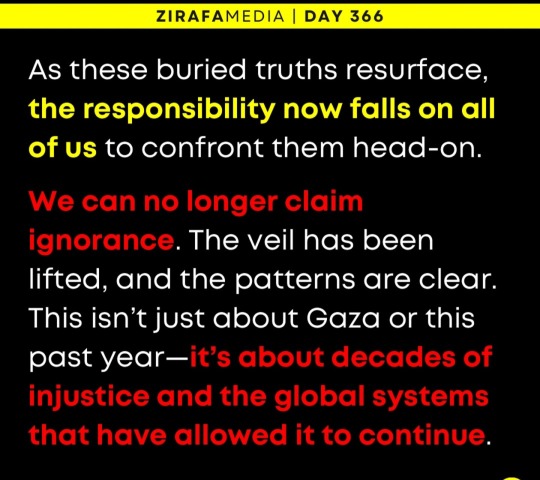
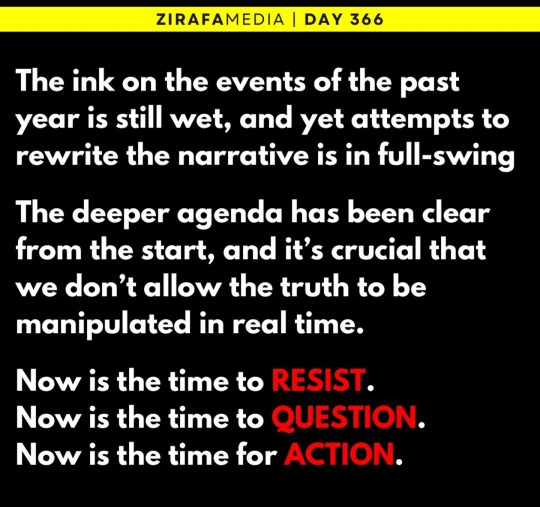
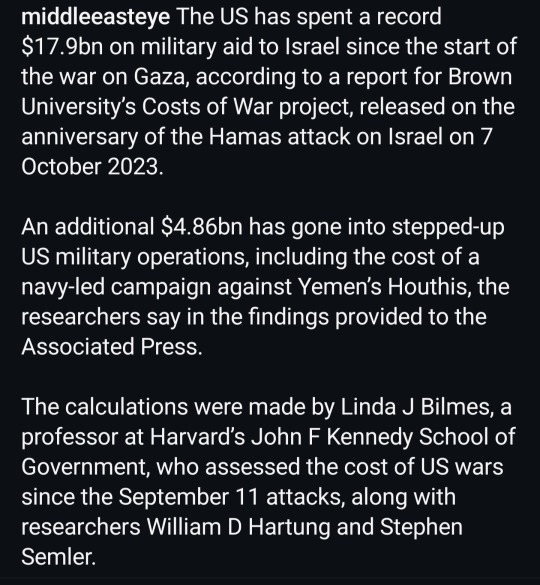
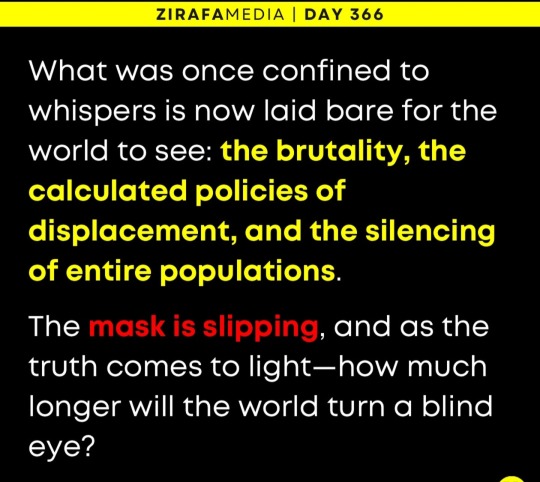
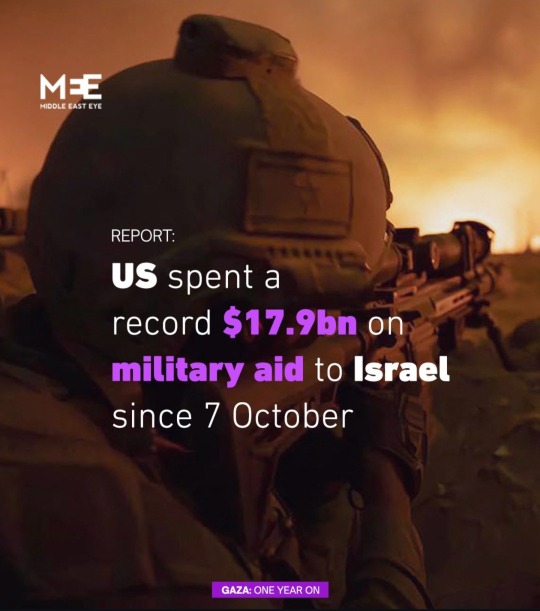
#the US is complicit in genocide and war crimes#stop funding genocide#stop arming terrorists#israel is not the victim#propaganda kills#israel lies while Palestine dies#apartheid#save palestine#israel is an apartheid state#ethnic cleansing#free palestine 🇵🇸#genocide#israel is committing genocide#israel is a terrorist state#lebanon#this was never about hamas#this isnt about Hezbollah#land grab#stolen land#stolen lives#israel never gave a damn about hostages#stop funding israel#iof war crimes#iof terrorism#palestinian resistance#Lebanese resistance#hezbollah#1 year of genocide with no end in sight#dont believe the lies#debunk and share
0 notes
Text

just an fyi: if you support hamas and hezbollah, if you support iran, if you support panarabism etc you are supporting the ideology that is causing genocide in sudan and other places. islamism is extremely harmful. the arab african slave trade is horrific. and yes, arab colonization caused just as much harm as european colonization, if not more because it ISNT TALKED ABOUT. IT’S IGNORED. people act like it never happened. imagine that, when your family and people suffered because of this, having that experience ignored and even rewritten. the pain involved. there are numerous levantine and african ethnic groups experiencing that right now.
so talk about it. stop hiding it and stop supporting it because people tell you criticism of islamist extremism is islamophobia. it isn’t. if islam isnt its extremist sects, than stop saying criticism of that extremism is criticism of islam.
109 notes
·
View notes
Text
if you benefit from being jewish on social media whether monetarily or socially and you have a large following, and you have not talked about the hostages, October 7th, the terrorism from hamas or hezbollah, and/or rising antisemitism on any platform you have. then i think its time to stop parading around the fact that you're jewish. yes I totally get that some accounts by jews are just for funsies because you want to enjoy art and fandom and cute animals. this isnt about yall I love u guys go curl up in blankets and enjoy some escapism. this is about people who have things like "jewish ✡ " in their bio and are getting paid sponsorships for thousands of USD yet have done nothing to stand up for the jewish community. who were radio silent on the topic of oct 7th, who dont care about the hostages, who only use their judaism when it benefits them and who couldn't care less about the rest of us. i think people like this need to either start speaking up for other jews right now instead of using it for money and social media points (but no they never will because then they will be the bad jews that goyim dont like and they'll face the same antisemitism they love to ignore (its only bad if it happens to them)). im absolutely referring to specific people and if you're wondering if its that person it probably is.
(also side note these people tend to be another level of awful to visibly religious jews, converts, israelis including those who are goyim, and non ashki jews)
33 notes
·
View notes
Text
Leftist Jewish American counterpoint:
You have no stakes in this, and also, mostly just nod along in agreement to, "Free Palestine", right? Because thats one of the many generally agreed upon rules of being progressive? We generally condemn colonialism, oppression, apartheid, ethnic cleansing, etc.)
So really quick information:
Hamas is funded by Hezbollah, an islamofascist terrorist group much like Al Qaeda, in Lebanom, funded largely by Iran, and other dogmatic, alt right, conservative sharia-law led factions. These people hate you, you liberal, queer, atheist, feminist infidels) These people are dangerous, radical, antiwestern extremists and literally starving and victimizing the Palestinians to use as their puppet martyrs, hijacking humanitarian aid and donations to them from Israel, the US, UN and NATO, while actively trying to create violent conflict in order to promote their narrative that Israel is actually the great colonialist oppressor ruining their lives. They literally don't give a fuck about the Palestinians and radicalize them with false narratives and blatant lies and propaganda to get their support and garner sympathy and concern from the western world, when their true, unapologetically blatant, factually spoken objective is to eliminate every last Jewish person from the face of existence.
There is a reason they were invading Israeli houses and shouting for "Jews" rather than "Israelis'" to come out from hiding to kidnap, kill and rape innocent women, children and elderly. They are literally Nazis. But you've bought into their narrative, and it's so easy to hate Jews, isnt it? so here we are. (You dont hate Jews, and condemn antisemitism though, right?)
What many of you think of as your "antizionism" is actually straight up antisemitism remarketed for your simple, surface consumption! BECAUSE, you dont care enough, it doesn't effect you.
So you're not actually well informed on the complex geopolitical history of the land over the past 2500 years.
Of course we all condemn colonialism, segregation and bigotry, but thats the history of humanity. We are in general, tribalistic at core, and only naturally altruistic to our own kind. We, as progressives do our best to overcome that base human instinct for the betterment of humanity.
Personally?
Fuck Netanyahu, fuck Israel's conservative government, their violence, their rampant human rights violations, their tacit avoidance of peace accords. the majority of Israelis, who also regularly demonstrate and join in rallies to Free Palestine, have nothing but criticism for their fundie leaders and want peace and integration with their Palestinian neighbors desperately. I agree, FREE PALESTINE. Give them their own state and tear down the walls and fences and tightly policed borders, allow them and help them to build self supportive infrastructure, let them into their common shared religious sites without apartheid like segregated territories preventing this. The vast majority of Palestinians are not the enemy. MOST WANT PEACE. Progressive Israelis are not the oppressor colonists, as youve been spoonfed by the vocal corrupt in charge of these terrorist organizations to believe. Most Askenazi settlers fled pogroms from Eastern European countries to the only safe haven that would accept them in. There are also many Sephardic Jews who are indigenous to Israel and lived peacefully for centuries alongside Palestinian neighbors.
Why does this have any affect on you, western progressives?
People are dying and suffering. They may not be in your country, but you can at least have some compassion for that fact.
Also this will effect the global economy, which, guess what? Will very much hurt you, and gas prices, and groceries and imports and taxes.
Before you form opinions on this very complicated subject, you should probably study the last 2500 years of the geopolitical history of the middle east, it might help.
Also, if you don't actually care because it doesn't have any bearing on you or your life, then why do you have any opinions on any global, international events? It's just a very odd take and raised a flag or two about your true biases.
6 notes
·
View notes
Text
Nationalism in the face of a nation state committing atrocities isnt the answer IMO.
yes, there are definitely bad actors attacking Judaism and Israelis. But that truth doesn't change the facts of crimes against humanity done "in the name of Judaism" (as the Israeli government likes to claim).
I think it is truly Jewish to be able to withstand the cruel antisemitism that abounds around these topics and yet still stand for what is right.
I am reminded of Albert Einstein, who, till the end of his life defended Israel from antisemitism and still also spoke out about their missteps.
Where you land on the spectrum is up to you and your personal beliefs, but openly stating that overcriticism of a state due to it being Jewish is preventing you from having qualms about their crimes is where I personally could not stand my personal hypocrisy.
Similarly, I try to be open about my criticisms of emancipation movements, like Hamas and Hezbollah - there is a lot to criticize, yet still remain firm that they are overall moving in the correct direction on one issue; that is, resisting Apartheid and genocide. Their war crimes and crimes against marginalized groups doesn't change that, but only a fool would simply state those things don't exist.
If you feel that Israel is being overcriticized, then defend that how you will! But recognize that others will see it differently. I, for one, don't buy the argument of Human Shields for any amount because the evidence isn't there! Yet it must be said that by doing the atrocities of October 7th, Hamas was counting on a body count of innocent civilians (that Israel fell into giving them) - which is completely unnacceptable.
But this stance of "well I can't even talk about the issues with human rights that Israeli society as a whole has because of the over-criticism due to antisemitism" only hardens you against positive change.
I would LOVE to post about all the fucked up shit Israel as a country has done. I would LOVE to have discussions about the murders and evictions being perpetrated by illegal Israeli settlers in the West Bank. I would LOVE to talk about how fucked up it is how Israel blockaded and ground down Gaza in the last few decades. I would love to actually get into the nuances of the fucked up, violent, and xenophobic branches of Zionism. I want to talk about all the wars started by the surrounding Arab states and the long history of antisemitism in the region without people accusing me of making shit up! I’d love to talk about Hamas and Hezbollah and how they’re puppets of Iran. I want to talk about Lebanon!!!!
But I can’t do any of that. Because y’all wanna kill all Jews. Y’all wanna destroy a fucking country. You want to paint an entire country and all its citizens as evil. You believe a group that makes up less than 1% of the population of earth is somehow controlling the world and forcing everyone to do their bidding.
And I can’t have discussions with people like that.
969 notes
·
View notes
Text
i know when ever something happens people are quick to be like “you’re just saying the media isnt talking about this because you dont read the news ����” which is sometimes true but i actually sit down and subject myself to the shoddy excuse for journalism that is CTV National News with Sandie Ronaldo almost every night (which is apparently the most watched news broadcast in canada, and for some people (especially older people) the only way they get their news) and the combination of 1) flagrantly biased reporting 2) how quickly they’ve utterly lost interest in reporting on palestine 3) with the terrorist attack on lebanon their reporting on has basically boiled down too “yeah that’s too bad ig. but it was to target hezbollah and now they’re scared so 🤷♀️ anyway, on to something that is absolutely not national news—“
#like. if you were an older person who only watched the news with your eyes at 5:30-6pm you would geniuenly have no idea of the scope of the#humanitarian crisis in gaza atm. i am not exagerating.
1 note
·
View note
Text
op literally defends hezbollah and the irgc and isnt a jew. don’t tell jews how to talk about our history. many of their posts have been straight up jew hate as well.
also brendan mcgeever isnt a pogrom scholar. he studies racism and antisemitism as a non jew with an ultra leftist bias.
my JEWISH STUDIES DEGREES HAVING ASS who took several courses on MY PEOPLE’S HISTORY and oppression and read hundreds of books and academic articles on the subject calls him out on his bias and disrespect for ACTUAL jewish history.
actual jewish agencies have called this a pogrom. but you are all so convinced jews are “crying” antisemitism. i thought “crying racism” was impossible btw? i guess that’s for everyone but jews. jews are manipulative, right? sneaky? trying to trick you so we can commit horrible crimes like baking children into matzah—i mean murdering the babies of gaza?
that’s why we must do something to CAUSE jew hate. we must have done something like:

burn flags
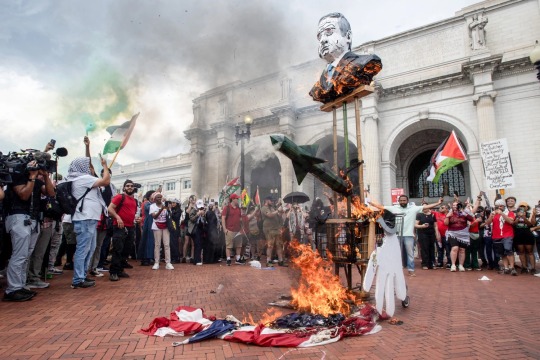
burn effigies
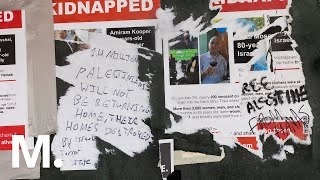
Rip down posters and flags
jews are always the ones at fault, right?
meanwhile:
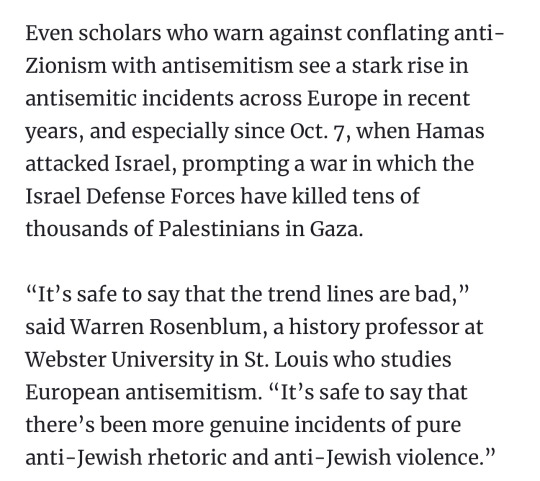
jews are the ones experiencing this violence. all of you talking over us and correcting us about our own history are only doing so to defend the people who want to hurt us. this attack purposely coincided with the 86th anniversary of kristallnacht. people were beaten unconscious and thrown on train tracks and run over with cars.
if you supposedly know the history of pogroms, jews were blamed for all of them. we were blamed for kristallnacht too. funny how none of you learn from this history you supposedly know so much better than us.
btw? the reason this is called a pogrom is because THE FUCKING PERPETRATORS CALLED IT A JEW HUNT. any mob attacks on jews are pogroms.


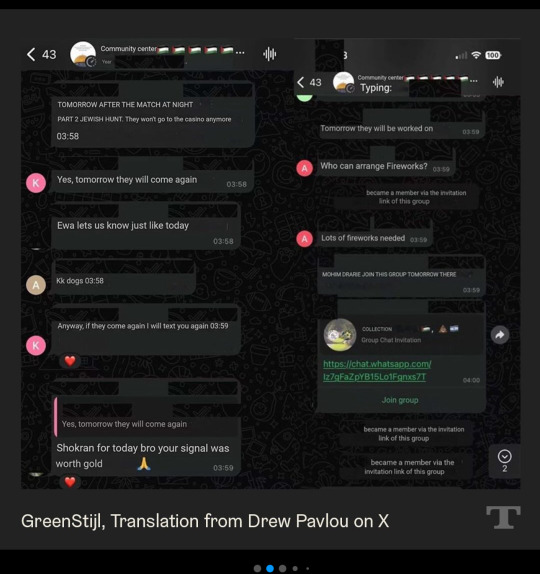
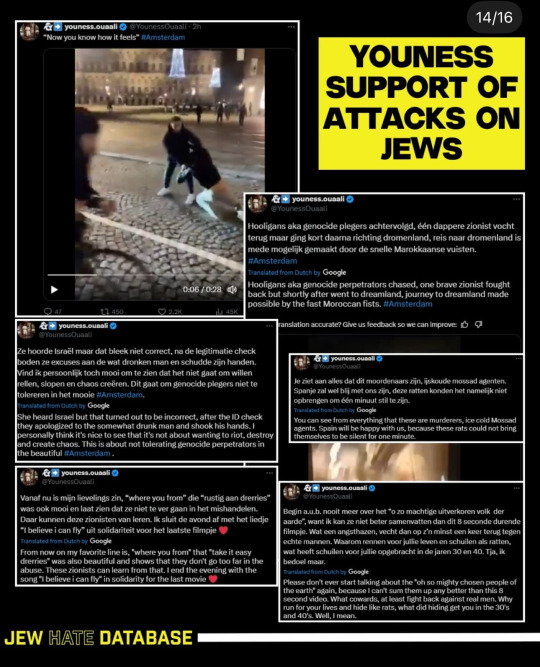
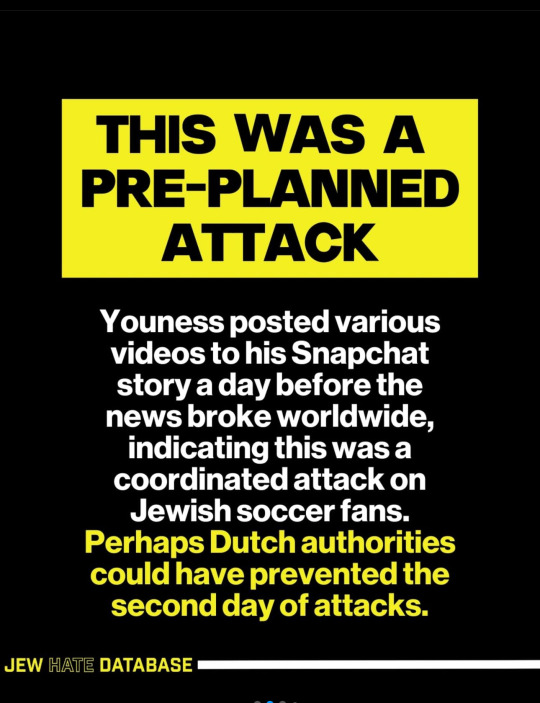

TWO DAYS. TWO DAYS OF ATTACKS.
i guess the PERPETRATORS calling it a jew hunt and following jews yelling JEWS JEWS isn’t enough for all of you.
but then, you defend hamas, hezbollah, and the irgc. they post, write, and say plenty about what they want to do to jews and what they HAVE done to jews. you just don’t care. you justify it all.
it’s also hilarious that those of you saying “dont call this a pogrom it’s dangerous!” are the ones calling a WAR a genocide and demonizing half of the world’s jewish population, as well as the one jewish state. you erase and coopt our history, so it’s hysterical that you claim to know it at all.








A review by a Jewish Pogrom scholar on why the violence in Amsterdam is not a Pogrom against Jewish folks and why it is dangerous and unhelpful to call it one.
1K notes
·
View notes
Text
The Freedom of Expression Ep.2 - Ghosn escapes to Lebanon
K: Hi, this is Dir en grey's Kaoru, this is the second installment of The Freedom of Expression. Um, Joe san, Tasai san, here we are again.
J, T: Yep *laughing*
J: Why are we laughing at that?
K: Well, somehow, while I was introducing you two, I was wondering whether I should also introduce the third, no, fourth person..
J: I see, I see.
K: I thought I'd leave it at that.
K: Yes, lets leave it there.
Kami: No, don't leave it there.
J: Ah, of course, we try to ignore him, he'll appear.
K: Ahh, but during the first episode, there were times without him, weren't there?
J: Sure
Kami: Ah, but I was just being quiet. I was waiting until the end to come in.
J: I see.
Kami: You played right into my hands
*everyone laughs*
J: We played into your hands? This god has a nasty personality, doesn't he? *K laughing* A god saying that?!
Kami: Of course you would tell me I have a nasty personality.
J: This god is surprisingly small, right? *K laughs a lot* ..saying such things?!
K: Okay, so lets get to the freedom of expression, the concept which we started on the radio and are now doing on youtube. Last time was our first try, how do you think it went, for anyone interested?
J: Well, just how DID it go?
T: Right, I'd like to know the reaction.
J: Yeah, I'd like to know. I'd like it to spread on social media.
K: Yes, me too.
J: Please, by all means, share this for us!
K,T: Yes
K: Right, well for our first item, over to you Tasai san.
T: Well, this is news from Tokyo Sports newspaper..
J: Oh, from Tokyo Sports? Like, is it a UFO or a monster kind of story?
T: Well, I know what you mean, but its not that today. Its about (Carlos) Ghosn.
J: Was Ghosn a monster?!
T:*laughs* No, no, no, its not that.
J: Really?
T: It was really big news at the end of last year. The news that Ghosn escaped to Lebanon. Firstly, what did you think about this, Joe?
J: Oh me? Well, Im one of those that thinks the Japanese judiciary system is terrible, so I thought it was convincing.
T: Ah, I see.
J: Of course it was an illegal thing, but for someone as rich as Ghosn, I think it was nothing.
T: Well, as for Ghosn, he is now in Lebanon, but its been said in the news that the recent worsening of relations between America and Iran will be really bad for him.
J: Can Tokyo Sports really report such a serious story? *K laughs*.
T: Yeh...We have to report this kind of thing.
J: Right
T: So, America killed Iran's number two, General Soleimani in an explosion, and with Iran calling for revenge action, the tension is such that, people are fearing WWIII breaking out. With the current leader calling on Lebanon's Shia military organization, you know the organization Hezbollah?...there is a possiblity that Lebanon could become a battle ground...in which case Ghosn would lose his place of saftety and he would have to flee from there, and might get arrested in a different country. Thats the story, how Ghosn might still be facing danger.
J: I see, direct.
T: Its really like a story from a movie.
K: Yes, thats right.
T: Hiding in a musical instrument case..
J: For sure!
K: A band came to his house right?
J: Yes, yes, he was having a party.
K: Yeh..and like hiding in the case...its interesting isn't it? *everyone laughs*
T: Its a case for a very large instrument, and the makers of it have issued a warning, that this case is not intended to be used in that way. *J, K laugh*
J: But there are not many people who escape overseas, its impressive!
K: Yeh, it really is like a movie.
T: Its great...there is even talk of making this into a movie.
J: Ghosn's story?
T: Yeh
J: Wow. Kaoru, have you any thoughts about this Ghosn news?
K: Well, while being quite simple, the scale is outrageous *laughs* I wonder how much it cost..
J: Oh, probably a considerable amount...its been said that it seems like his fortune has decreased..but it probably hasn't disturbed him too much.
T: On the issue of bail, he paid 15 billion yen, which was apparently further confiscated, but Ghosn probably doesn't give a damn about that.
J: Probably not
K: When he came out, he disguised himself right? Its also kinda interesting from that angle.
T: Oh, dressed like a cleaner, right?
K: Yes, yes, yes.
T: It seems like he thought it would work
J: Well, another thing is, the Japanese judicial system is said to be a so called 'hostage judiciary'. In Japan, the prosecutors have the right to charge people with a crime, but out of all charges made in Japan, 99.9% are found guilty. In other words, if you are charged, the court case is more of a formality, you will almost never be found innocent. It equates to one out of a thousand cases being found innocent. Now, as far as I know, the conviction rate should be a bit lower, ninety-something percent, but if you lower the conviction rate much, the authority of the prosecutors is suspected, as if the original charges were wrong. Its difficult, but a conviction rate of 99.9% is quite extraordinary. So with the fact that prosecutors have so much power, and with this 'hostage judiciary', so called criminals are pushed to confess. At first they are questioned without the presence of a lawyer, and there are many cases where foreigners confess to the crime, even if they havn't done it. The police will say to people, 'you are not leaving here till you confess'. Now, if you really didn't do it you could provide your evidence to the court, but in Japan, the court will take a self confession as the strongest evidence. So, in the end, once you've said 'i did it', you might as well have done. And even if you later say 'i didn't do it', it will only be seen as a lack if repentence, you will not be found innocent...and Ghosn must know all this. This court case is predicted to go or for 5 or 10 years, and say, if it was ten years, his life is already nearing its end. Whether its right or wrong, he probably arrived at the conclusion that he had no choice but to escape.
T: He can do it because he has money.
J: Exactly
K: Ah, its turned into that kind of conversation.
J: Eventually, yes. We are not all equal.
K: But, couldn't you say it would better that he had stayed in an orderly place like Japan?
J: Yes, yes, especially if the place he has escaped to becomes a war zone. Theres a chance that Japan might end up being the safest place for him.
T: Which do you choose, an approaching war with your freedom, or a safe place facing a court hearing?
K: Oh this is gonna be a movie.*laughs*
J: It seems likely...But who would play Ghosn? Who looks like him?
K,T: *????* 1*
J: He's the only one who could do it! If it was dramatized..
K: It makes you wonder how Japan could let this happen, Ghosn was probably surprised too.
T: So for people who are out on bail in Japan, they do sometimes make them wear gps locating device, or restrict thier movement. It seems like Ghosn has really thrown Japan into disorder.
J: Hmm, in Japan, whenever there is a happening, the measures taken against it are often 'too much'. So, if you talk to people in other countries, recommendations will differ. For example, in France or somewhere like that, a traffic accident happens, and someone dies...Well, i mean, if it was in Japan, they would install a pedestrian crossing and traffic lights, which is ok in itself, but if you do this type of thing too much, it starts to get inconvenient. But if it was overseas, a traffic accident where someone dies, they would just warn people to be more careful next time. Rather than doing sonething physical, just encourage people to be safer, and after that finish with it. In Japan, they would definitely either install facilities or place equipment, measures to prevent it happening again, but on the other hand if this is done too much, you may eventually end up with restrictions on you speech or movement, so thats something we have to be careful about.
K: Mm, if you blame other people or things, you may end up losing your sense of self responsibility.
J: Things primarily happen due to our actions, we need to remember that, but people will end up blaming other things, for a sense of security. This becomes a vicious cycle, I feel.
T: This has been excessive recently, funny stories about celebrities being criticized for saying certain things, and then nothing happening.
Kami: Um, is it wrong to be on Ghosn's side?
T: No, I think its ok.
K: Its a personal opinion.
Kami: If you were on his side, he might give you money if you ask him *everyone laughs*
T: What a wierd opinion for a god!
J: You really are working for money, aren't you!
Kami: Well, I just thought if I was rich I could be in control of everyone.
J: I see, I see.
Kami: Like if I told people to cooperate with me, they would say, yes, yes, and just do it. Like, I would say to Tasai san, can't you write a nice article about me, and throw over a bit of cash..
T: I would be quivering
K: *laughs*
J: If it was Hiranabe san, you'd have to take him to dinner.
Kami: Yeah, I've a feeling he would say, 'Ghosn was right!'.
J: I guess so.
Kami: I mean, even if the story in the media is a joke , if someone said 'I'll give you a billion yen if you do it', you would do it right?
J: Well yes..a billion.
Kami: The real god, wouldn't be like that of course...but I'll do it for small change. *everyone laughs*
J: How much would you help Ghosn escape for?
Kami: About 10,000yen.
J: So cheap!
Kami: Its because I know my capability.
T: Isn't god supposed to be all powerful, and all knowing?!
Kami: No, I can't do anything.
J: A god who, can't do anything, strange isnt it?
Kami: Its because no-one worships me.
J: Ah, I see.
K: Aren't you just a regular old guy then? *lots of laughing*
J: And here's me thinking we were getting somewhere deep!
Kami: I only know one deep thing about this. Straight after he was interviewed by the Juicial minister, the minister said that Ghosn will have to prove his innocence, right?
J: Yes, that was mistaken, wasnt it. Completely wrong.
Kami: The rest of the world media heard this, and thought Japan was in the wrong. It is in the wrong, right?
J: Well, that person was orignally a lawyer, um, I dont know if the youtube viewers are aware of this, a defendant doesn't actually have to prove anything. Its the prosecution side which has to prove the guilt. A defendant doesnt prove his innocence at all. So if a harsh sentence is given, that means the prosecutors did thier job, and if guilt isnt proved, that means the prosecutors couldnt prove it. There is no legal situation where a defendant has to prove thier innocence. So, the justice minister saying Ghosn must prove his innocence was probably seen as ridiculous by the rest of the world.
Kami: Well, it is if its said by the justice minister.
J: Well having that kind of person in such a high position, can the rest of the world trust this country? Its a wierd story, the world's mass media have been laughing, can that kind of guy really become justice minister? But as you said, maybe he's just expressing Japan's inner feelings about this. Oh, Kami is gone! * laughing*
Kami:*laughs* No, I was listening attentively. I was listening, and thinking, he had to run away from Japan.
J: Oh, right.
T: I see.
Kami: Yes, get away from Japan..consumption tax has risen too of course * everyone laughs*
J: Well, yes.
Kami: The Olympis will cost money too..
T: And theres that iternet tax.
K: You know a lot, dont you kami?
Kami: Ive been saving money *everyone laughs* I never have enough.
J: Are you a poverty stricken god?! *lots of laughing*
Kami *stifled laugh* Don't say that.
K: Ok, well lets wrap it up here, the second episode. Please tune in next time.
J,K, T: Thank you very much.
1* I don't know who they said here.
25 notes
·
View notes
Text
something that this website is so absolutely terrible at doing is talking about current events without turning it into some weird situation where you have to worship the person who was wronged.
let me preface this with, the us drone strike on iran was not only fucking stupid, it was blatantly illegal and morally wrong. it should not have happened, and it’s going to cause a lot of problems in the middle east. again. the us keeps getting involved in the middle east and causing issues and im so fucking sick of it and sick of watching the us meddle in affairs it should stay the fuck away from.
but the way some of yall are now turning this into some weird way to worship qassem soleimani??? is really kinda disturbing. and you know, i would bet $100 the majority of people all of a sudden praising soleimani don’t even know who he was or what he did. i agree that the us has once again fucked up and that again, what they did by killing him is atrocious and horrible in the most clear terms. but the fact that in order to call out what the us did as horrible yall feel the need to act as though soleimani was this what, military hero???? really demonstrates a lack of ability to critically look at a situation and be like, yeah this person has caused a lot of issues but he still shouldn’t have been killed like this. to be able to say that oh, yeah this situation is complex and it isn’t a simple black and white situation, but i still can form a critical opinion about it.
soleimani pushed back against the iraqi kurdish movement for independence, and praised saddam hussein’s mass murder of iraqi kurds back in 1991. https://www.reuters.com/article/us-mideast-crisis-iraq-kirkuk-fall/iranian-commander-issued-stark-warning-to-iraqi-kurds-over-kirkuk-idUSKBN1CP2CW
soleimani is largely responsible for iran’s political influence in iraq, lebanon, and syria, aiming to spread iran’s very strict ideological policies throughout the region. he supports hezbollah and other iranian proxy forces that continue to fan the flames of conflict throughout the region. https://www.washingtonpost.com/world/2020/01/02/iran-qassem-soleimani-dead/
in the syrian conflict, soleimani supported the assad regime against the rebellion, fanning the flames of the conflict and helping keep assad’s regime upright. some people see this as a way to keep isis from gaining more power in syria. some people see this as supporting a cruel evil dictator who conducts chemical weapons attacks against his own citizens. like ive said, nothing is black and white, and syria is far from a simple situation. https://www.washingtonpost.com/world/2020/01/02/iran-qassem-soleimani-dead/
in the yemen conflict, soleimani supported and supplied the houthi rebels with weapons and training to fight, which more or less turned yemen in to a proxy war between iran and saudi arabia. https://www.bbc.com/news/world-middle-east-29319423
soleimani also did largely help keep isis out of iran. he is widely revered by certain groups throughout the middle east, including many in iran. and many view him as a martyr for what he has done in fighting against isis throughout the region. like i said, nothing is ever black and white. https://www.aljazeera.com/news/2020/01/qassem-soleimani-iran-elite-quds-force-leader-200103033905377.html
the point of this post isnt to say you should hate soleimani, or that you should love him. it’s to demonstrate how this isn’t some simple situation, it isn’t a “oh the bad guys killed the good guys”. it’s very very complicated, and should be treated as thus. it’s very very clear that the us drone strike killing soleimani was wrong. but that shouldn’t mean that yall are unable to recognize that soleimani did both good and really terrible things. if you are unwilling or unable to discuss current events in a way that looks at all angles of a situation, and refuse to stop turning people into idols in order to prove your argument, then you shouldn’t talk about this at all on social media. please just do some goddamn research and fact check everything. which is also why ive included links above, to show that im not just pulling this out of my ass. i invite you to do the same.
37 notes
·
View notes
Text
"Stop killing children"
Have you told Hezbollah that, calyxmore? Iran? Russia? Turkey? Isis? China? Or are you telling only Israel that? Do you only care when Israel kills children? Be honest now.
As for "auctioning land", I don't even understand what the allegation is. Are you referring to the real estate meeting that sold estate IN Israel NOT in the west bank that hamasniks used as a pretext to attempt a pogrom?
- my friend, who lives in Moscow (Russia) and has family under bombing in Odesa (Ukraine) and has to face every day the cruelty of Putin the left conveniently decided to ditch the moment israel was attacked. Btw, you (calyxmore) were indeed referring to the real estate meeting that sold estate in israel behind the green line, meaning not in the 'west bank' (judea and samaria)
'LMAOOO all she can do, the only tool in her arsenal apparently, is invoking the False Equivalence Fallacy. LOL none of these idiots learned how to debate (I mean, obviously, most of them are functionally illiterate)
We're like, "You're using a False Equivalency here, your argument is stupid," and they're like, "Yeah? Okay, well, here's another False Equivalency"'
- the previous responder, I do truly enjoy his responses
My first reaction to your response was honestly 'is she serious? How the fuck do the two matters connect?' and then it was 'so israel isnt allowed to be upset about children being murdered while playing on a soccer field (that was not hiding tunnels or an army base and so was not a legitimate military target)?'
you basically say that israeli lives being cut short by being literally evaporated by a bomb (the wire fence was red from all the blood and the children were not whole when found. You probably are salivating over this description, imagining with sick pleasure the deaths of israeli children) is not worth mourning over. And no, those kids did not get a warning. The moment the sirens were heard the bomb already landed, that's how close madjal shams is to the border with lebanon. (A kilometer away, thats it.)
And now, the fact that you invoked the 'free Palestine' movement... Sigh ... clearly you have no idea what your precious 'free Palestine' movement actually is, so you truly have my sympathy.
The only ones who actually gave a damn about gazans were israelies, and the gazans repaid that by slaughtering the very people who helped them, those who drove them into israel for medical assistance, who got them their work visas, who welcomed them into their communities and lives, who worked towards a peace between israelies and gazans. Who believed they deserved a true democracy and not the farce hamas enforced over the citizens.
I had said that at the beginning of the war and I'll say it again, hamas murdered and butchered all the peace idealists, all that was left behind were the pragmatics.
And no, in the current state of matters we cannot have peace with those that used our kindness to gather intel of our communities and allowed hamas to know exactly who was in which house, where the safe rooms were, and where they could enter the communities easily.
So until you realize that the very movement you claim to be part of has no intention of helping or caring about the gazans, and that its sole purpose is the death of jews and israelies, we cannot have a proper conversation.
Until then, you have shown yourself to be a total hypocrite with no understanding the kind of bullshit youre spouting.
- me


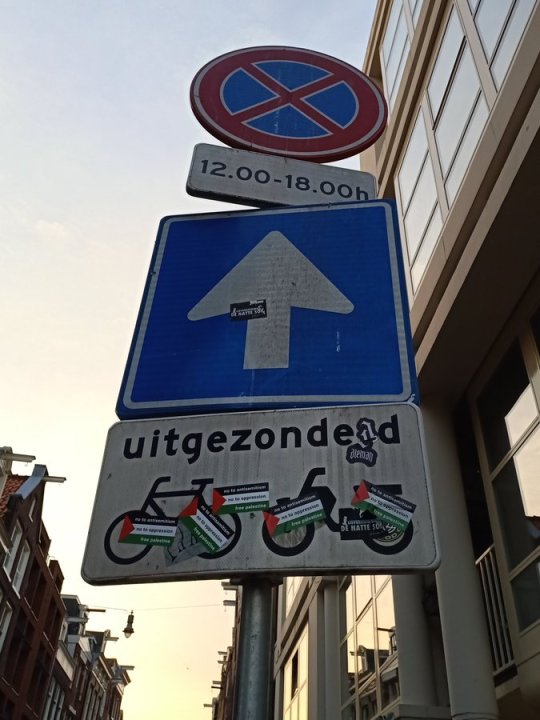
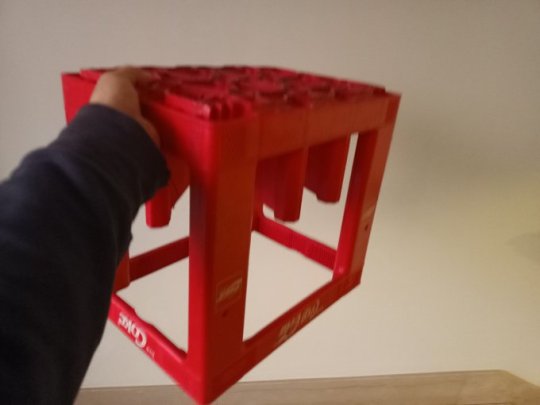

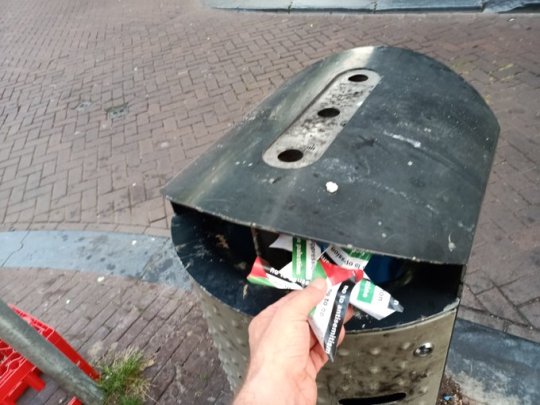
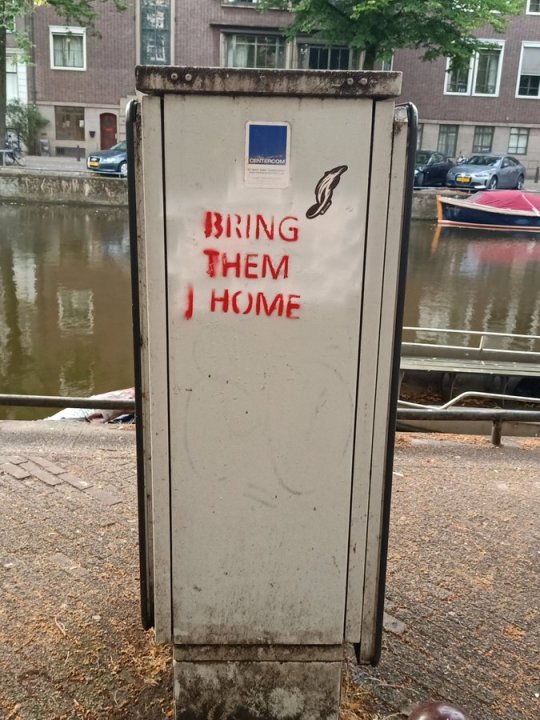



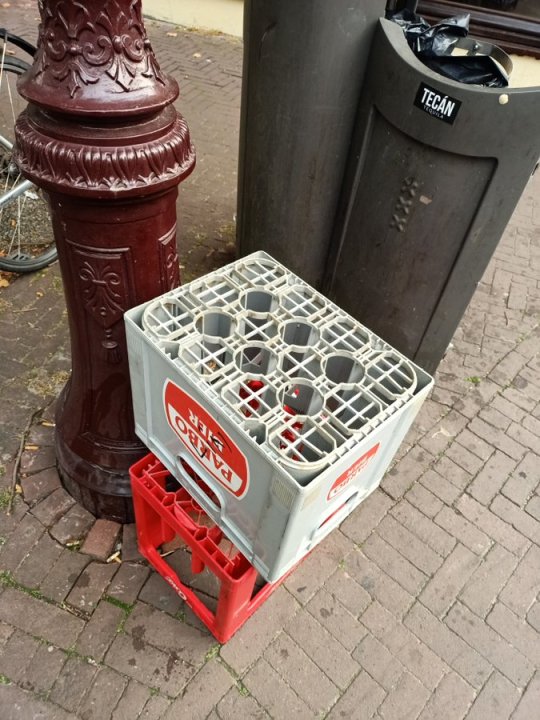
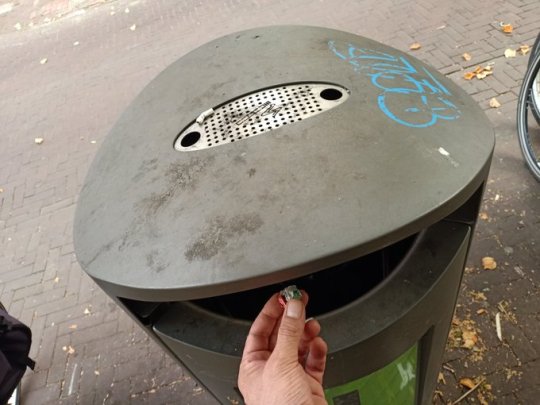
32 notes
·
View notes
Link
The Post, nonetheless, has given a platform to JVP members, particularly in its Outlook section. The newspaper has published Rebecca Vilkomerson, the group’s then-executive director, and Post columnists like Ishaan Tharoor and Eugene Scott have cited the group as representative of “progressive American Jews” — overlooking that most American Jews are both left-leaning and supportive of Israel. JVP is fringe.
But that’s not how The Washington Post sees it. The newspaper wants to believe, facts to the contrary, that many Jews are disdainful of the Jewish state. Why? Because the Post believes that they should be. In its worldview, Israel is largely responsible for the lack of peace. And Arabs, the Post’s coverage implies, are without agency or responsibility.
On Sept. 25, 2019, Mahmoud Abbas, the leader of the Palestinian Authority, announced that he would soon set a date for elections. Abbas’s announcement is newsworthy; the PA hasn’t held elections since 2006 and Abbas himself is in the fourteenth year of a four-year term. Several leading news outlets covered his remarks, including The Times of Israel, Ha’aretz, and The Jerusalem Post. The Washington Post, however, did not.
Instead, the newspaper published a 1,000-word “report” about how “Palestinian artists in the locked-down Gaza Strip are inspired by works they may never get to see.”
Indeed, when the newspaper isn’t busy painting either Israeli Arabs or Palestinian Arabs as victims, it’s omitting key facts.
Take, for example, the newspaper’s Sept. 25, 2019 report “Are Arab Israelis having their moment?” The dispatch, by correspondent Ruth Eglash and Jerusalem bureau chief Steve Hendrix, noted that a “surge of Arab voters proved decisive in denying Prime Minister Benjamin Netanyahu the parliamentary seats he needed” in Israel’s September 2019 elections.
Arab citizens of Israel enjoy equal political rights and are equally represented in leading industries and government, including the Knesset, where the Arab-led Joint List is the third largest party. In fact, for the second time in six months, more Arabs voted in the Jewish state than in neighboring Arab countries. Nonetheless, the Post uncritically quoted the leader of the Joint List, Ayman Odeh, who claimed: “No one will give us the equality that we deserve, so we are going to take it for ourselves.”
The newspaper also noted that some in Israel have concerns about the Joint List — but the Post didn’t offer any details as to why this might be the case.
As Tablet magazine documented in a Sept. 23, 2019 report, “The Joint List, sadly, remains a vehemently anti-Zionist party whose members have often expressed their support for convicted terrorists.” Reporter Liel Liebovitz noted that Joint List member Haba Yazbak has praised convicted terrorists on Facebook and supported an Israeli-Arab citizen who was indicted for spying on behalf of Hezbollah, the Iranian-controlled Lebanese terrorist group.
13 notes
·
View notes
Note
With the Syrian civil war looking like it's winding down, what's your geopolitical wishlist for how the region shakes out? Any particularly interesting roads things could have gone down earlier in the conflict, that didn't pan out?
Idlib is still a big ???? especially with trump withdrawing and HTS completely ravaging the turkish backed NFL and other lesser salafi groups, which opens up the area to Syrian attack because HTS isn’t protected by turkey
And on that note, there is a huuuuuUUUuuUUUge ????? with the future of rojava because… well. independence isnt likely and the syrian government AND the turkish government is keen on taking what the Kurdish SDF claims.
The syria story is not done yet and thats really all i can see for the next few year, consolidation or further conflagration in Syria and Iraq.
Besides that, of course, is the continued shitmess in Yemen.
Otherwise, things may heat up between Armenia and the Azeris.. annnnd uh. Short of a global economic crisis, things seem like the status quo.
>Any particularly interesting roads things could have gone down earlier in the conflict, that didn’t pan out?
Well, of course, the primary what-if:
Alt-history of the immediate success of the rebels.
This would require more of the army had defected than what had. Had they won in holding and knocking out Assad-loyalist urban centres in those critical first 2 years, a number of critical things would occur:
Upon the blitzkrieg of ISIS arising out of Syria, into Iraq and back in again, much more of the whole of that country would’ve been swept by ISIS. Aside from the formation of an embattled and would-be victorious, urban rebellion and the establishment of a transitional rebel government. Assad wouldn’t be totally knocked out, but he would flee Damascus to the coast where a remnant bloc would resist the rebellion. Disparate loyalist holdouts in the south would resist rebel control as well as Republican Guard and SAA dug-in defenses of neighbourhoods in central Damascus itself, but power and control over the majority of the population would go over to the rebels while the so-called regime would retreat to Latakia before the Russians intervened to protect their naval investment at Tartus and it’s ally. Hezbollah would mount a defense of the Anti-Lebanon Mountains and push back with remaining SAA down into the foothills north of Damascus where they would establish a toehold of the rural regions. Any hope for a future as we now see it, with Loyalist reconquest of most of Syria, would cease to exist or be extremely limited, to which i will get to later.
Provided the explosive expansion of ISIS, the Kurds wouldve completely collapsed in northern Syria and be obliterated against the turkish border as the turks originally wanted and pushed back behind Qamishli and Afrin, where compressed against allies in Iraq and US support, halt a retreat and establish a line of control. ISIS would be preoccupied with combat in urban centres in western syria and central Iraq and would mount little more than defensive lines here in north eastern syria.
ISIS would have really emerged even stronger than they did in this timeline. They would’ve swallowed more of al Nusra, without the daring loyalist grasp on Aleppo as a buffer, and flown into the eastern half of the city, smashing against the rebel siege of Aleppo’s western half, turning it into a four way death match. Nothing of Aleppo would come out without total ruin. Similarly, without government buffer around Homs, Hama or Damascus, ISIS would proceed to take more of the critical populated core of the country, running north south from Aleppo to Damascus. Palmyra and numerous other ancient sites would experience broader destruction and looting. It would be an archaeological catastrophe. The genocide against minority groups would continue. Because of the enormous strength of ISIS, behind the frontline, more religious brigades and factions would splinter or declare loyalty for ISIS, turning a would-be stalemate into a situation where rebel forces would begin giving on the fronts to it’s west and east. Free Syria would begin a gradual decline and loss of it’s urban centres to ISIS.
Russia, having entered even sooner out of urgency of the sitaution yet with no point in propping up the collapsing Assad government and it’s maintenance across all of Syria, would attempt to bolster the remnant successor state west of the nusayriyah mountains. At some point, it would begin to assist in pushing out past the Orontes River in attempt to capture idlib (the city), Hama and Homs where rebels would be extremely dug in against ISIS. Outside of this band, there would be an insanely vicious and violent effort to hold Damascus and Aleppo. Both would likely be lost, except Damascus would hold out the longest, if not actually reach a stalemate.
This is so because the SAA, after restructuring and the establishment of the Tiger Forces, would send General Zahreddine to mount the Republican Guard defense of central Damascus as Deir Ezzor would have already been lost to ISIS by this point. With this, Tiger forces would join the Hezbollah descent from the mountains to try and break the siege of Damascus as a priority while the rest of the SAA slowly push back against Free Syria once the FSA is beset by ISIS. If the SAA and loyalists are or were to have any success, it would be the stabilization of the nusayriyah front and, long shot, the breaking of the siege of Damascus. This feat would be a crucial priority for the loyalist faction for symbolic as well as administrative reasons.
So here’s my map of uh, i guess 2015/2016 Syria in this invented timeline
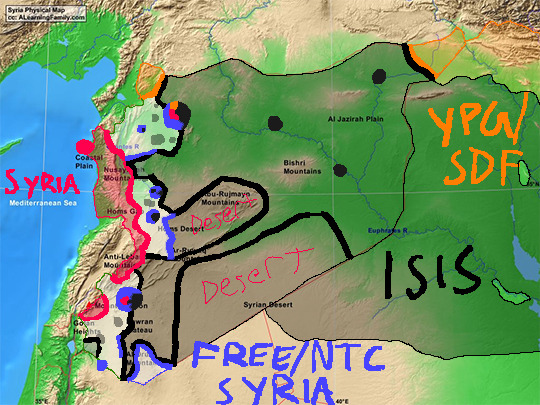
Because this would be the Zenith of ISIS power inspite of it’s strong show.
Why? Because the west would be EXTREMELY invested in protecting the fragile, newly established Free Syria as well as motivated by the threat ISIS means in this timeline, as it will control the majority of Syria and a sizeable portion of Iraq. The response by the West would likely be more than the waffling we saw, because since ISIS swallowed more of the salafist assets of the FSA and the FSA itself would be more than a simple rebellion but the primary power-broker in the region.
The FSA becomes the primary ally of the western push against ISIS (rather than focus turning to the Kurds) and after a somewhat longer period of time, we may arrive at what we have here:
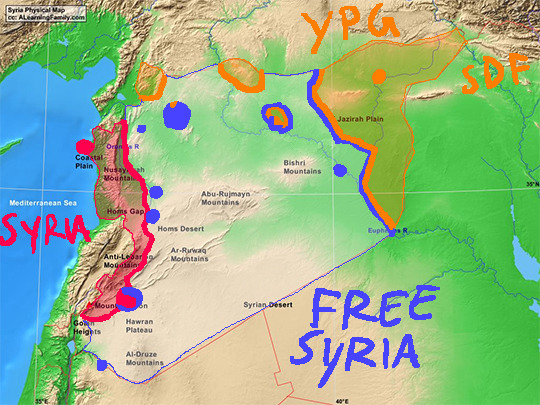
Except, perhaps more FSA would go thru Turkish territory east of the Euphrates, but I think Turkey wouldn’t have had as big a role as it did if the YPG weren’t totally diminished in Syria. So, aside from a resurgence in the north east and the Kobani push, the FSA would probably outpace the kurds in capturing ISIS territory.
And outpace them they would have, as unlike this timeline, there would be declared and enthusiastic US support on the ground by 2017, because the United States would be EXTREMELY invested in preventing Loyalist Syria from retaking it’s urban centres.
Just like what the USA did in blowing the shit out of Russian mercenaries east of Deir Ezzor in our timeline, they would give the SAME treatment to the Loyalists Once Trump takes office. If the Loyalists are lucky, they will have broken the siege of Damascus but little more besides, as Syrian army strength is severely lacking in manpower as more had defected early in the war.
Russia, not as invested in their ally as they were in this timeline, would likely be less liberal with their bombing campaigns anyway, and really wind it down once the USA fully commits to Free Syria. Russia would be extremely loud in it’s complaints and whining over it’s inability to act here, but this wouldn’t last forever.
Now. the above map isn’t static, but rather a glance at affairs at the moment of total defeat of ISIS around this time or a couple years into the future.
After this, it’s ENTIRELY likely for “Free Syria” to fragment much as the Triumphant Libyan successor state had. In spite of it’s valour, the Free Syrian army is little more than various brigades and ideological allies of convenience.
al Nusra would still be present. In fact, they would have participated and secured alot more territory than Idlib. This would be extremely an issue, and perhaps, an avenue for the loyalist to retake Syrian lands in idlib and elsewise, depending on whos a closer ally of the west or not.
What’s more, ISIS cells would just go underground as they had in our timeline and would actually intensify their revolt around the already weak consolidation efforts of the FSA. A Free Syria won’t last. It will be a clusterfuck that I can’t even begin to anticipate because of the nature of all the ideologies and brigades. This Free Syria would certainly become a failed state. What’s more, ISIS would reemerge.
In light of this, i probably overestimate the capabilities of the “free” rebels in leading the charge against ISIS.
but whatever, i spent waaaay too much time thinking on and writing about this, so im just gonna go ahead and post it without spell checking or grammar or whatever lol
9 notes
·
View notes
Text
Israels Ex-Prime Minister Ehud Barak Says Keep the Iran Nuclear Deal
TEL AVIVEhud BarakIsraels most decorated soldier, former army chief of staff, and former prime ministerwas in an introspective and relaxed mood one recent Friday.
Not surprising for a man, now 76 and sporting a late-age black beard, whose life began even before Israels creation and brought him to the states highest pinnacles of power. Also explaining the mood was the English-language memoir he has coming out this week in the U.S.titled My Country, My Life: Fighting for Israel, Searching for Peacea long and weighty effort, he said with relief, that interweaves his own personal and political journey with that of his nation.
A notoriously evasive interview subject, Baraks responses come out in torrents, like a university lecturer confident in both his own intellect and that of his audience. At various points during a long and expansive conversationabout Iran, Syria, Russia, the Palestinians, Benjamin Netanyahu, and morehe throws in references to Hume, Kant, Fukuyama and Jonathan Haidt, as well as the many Israeli and world leaders (Obama, Putin, Bill Clinton, Yasser Arafat, Yitzhak Rabin, Menachem Begin, to name a few) he has worked with going back decades.
Hes not obfuscating necessarily, but rather patiently explaining, trying to convince, trying to make you see things his way. If hesitation creeps into his voiceif he feigns uncertaintythen its likely for a greater purpose. I do my best to open peoples eyes and make people aware of where this government is taking us, he said, jibing with his recent reemergence on the public stage as a fierce critic of the current Netanyahu government.
There are few in Israeli politics with the experience and gravitas to make a stronger case. Yet he himself has been out of politics for five years now, his last position as Netanyahus defense minister, a role his left-wing (Labor Party) base likely still hasnt forgiven. Its precisely this fact, though, combined with the reality that hes one of only three still-living prime ministers, that arguably gives him the most insight into the many fraught issues facing Israel today.
Take the perceived weightiest of them all: Iran. Barak, as defense minister from 2009 to 2013, was deeply involved in the run-up to the signing of the Iran nuclear agreement. Indeed, he, more than Netanyahu, was known to be a hardliner on the issue, even going so far as to ready Israel for a preemptive military strike against Irans nuclear facilities. For a variety of reasons it didnt happen, he told me. There was actually strong opposition from within the security establishment and also from the [Israeli] president and the media. A lot of opposition.
The Iranians are bad guys and they remain bad guys, but they have kept the letter of the agreement quite systematically [and] all in all it delays the new starting point or countdown towards a nuclear capability.
Ehud Barak
However, once U.S. President Barack Obama signed the nuclear deal with Iran, in 2015, Baraks thinking changeda point obviously relevant for the current moment. I think this deal was bad, I said it in real time, and other approaches should have been taken. But once it was signed its no longer a philosophical question, its a practical question. Is it smarter to tear it apart or keep it in place? he posited. And here there are many points of view on both sides. Theres a lot of logic in maintaining it in place.
The Iranians, according to Barak, are bad guys and they remain bad guys, but after the deal was signed and began to be implemented they kept the letter of the agreement quite systematically [and] all in all it delays the new starting point or countdown towards a nuclear capability.
Obama was an intelligent president, Barak went on, he understood that he took a certain gamble for the first half of the term of the agreement. Its clear that the Iranians would do nothing because they want to harvest all the benefits. But about the second half, its only a gamble.
If Barak had his way post-deal, Israel and the U.S.including under Obamawould have come together behind closed doors to hedge against the risk: bringing all their intelligence assets to bear on monitoring Irans behavior, finding agreement on what exactly would constitute a nuclear breakout, as well as clear guidelines for putting the military option back on the table. I thought we could do it, he said, but Bibias he repeatedly called Netanyahu, using his nicknamechose to do something else with the big speech [to the U.S. Congress in 2015] that I thought was a mistake. But thats all about the past.
This wasnt the only time during the conversation that Barak diverged from his former boss on Iran strategy (and many issues besides). Even Netanyahus public reveal last week of over a hundred thousand documents from Irans nuclear archive, allegedly obtained via a daring Mossad operation, failed to sway Baraks opinion.
As Barak put it, it was a truly remarkable intelligence achievement… and there was lots of material [there], but nothing thats new. Nothing substantive about what they did and didnt do that wasnt already known to intelligence for years now. Not one new item. In this respect, [Netanyahu] didnt bring what he should have brought, i.e. the smoking gun.
The best is always to be extremely calculated and perceived as totally unpredictable. In the real world thats not easy to execute.
Ehud Barak
Contra Netanyahus emphasis on Tehrans perfidiousness, Barak stressed that everyone knew the whole time that Iran is lying, and that was one of the reasons for all the arrangements in the nuclear agreement. Theres no proof that [Iran] continued doing things that arent permitted, he stated flatly.
Netanyahus performance, though, may have served a different purpose: to sway public opinion in general, and support Donald Trumps inclination to pull out of the nuclear deal on March 12 in particular. Barak assessed that this was almost a foregone conclusion, especially with John Bolton and Mike Pompeo now advising the U.S. president. For all that, he didnt think that the U.S. pulling out would necessarily spell the end of the nuclear deal (a multinational agreement, it should be remembered, between Iran and five additional world powers) nor that Iran itself would pull out and race ahead towards a bomb.
[The Iranians] arent backgammon players, theyre chess players, he said, using a clich that coming from someone elses mouth, with less direct experience battling Iran and its proxies, wouldve seemed trite. They are clever and self-controlled enough not to provide this excuse, especially to this wildcard U.S. administration. Irans real fear, he observed, was a direct military clash with the U.S. that would spell the end of the Islamic Republic; they would, at least in the early going, likely avoid giving Trump this pretext.
In the longer term, however, the U.S. leaving the agreement may provide Tehran diplomatic cover if it was caught violating the terms of the deal. The Americans started it, American behavior basically legitimized our own deviation, Barak said, channeling his inner Iranian official.
Barak freely admitted that this was all speculation: an assessment, to be sure, based on his time at the highest levels of global politics, but also a dangerous game. There was no guarantee that Netanyahu and Trumps wishesto apply renewed pressure on Iran, in the hope of getting a better dealwould work out. Wouldnt the chances of miscalculation and war increase?
The best is always to be extremely calculated and perceived as totally unpredictable. In the real world thats not easy to execute, he said.
Ive known Putin from his first day in the Kremlin, hes an extremely practical person, effective, with two feet well on the ground.
Ehud Barak
As with most Israeli officials who came up through the military, Barak maintains a remarkable equanimity regarding the prospects of potential future conflicts. He recalls, albeit as a young child, Israels first war, for its independence in 1947-48, and the American assessments that the fledgling Jewish community in the Holy Land wouldnt survive. Put in this light, the looming confrontation, for instance, between Israel and Iran over Syria and possibly Lebanon too isnt inevitable and nobody needs it, certainly not Israel, he said, but more to the point, were the strongest country in the region so if were compelled or coerced into a war well hit back very strongly.
The fact that this arena has come to the fore in recent months, with Tehran and Jerusalem now publicly trading threats and occasional direct fire, isnt helpfulhe wouldve much preferred to keep all of it out of the public eye and run through clandestine channels. Surprisingly, he had relatively positive words for the Russian role in Syria.
Ive known Putin from his first day in the Kremlin, hes an extremely practical person, effective, with two feet well on the ground, Barak said. Russian interests in Syria, supporting their client Bashar al-Assad, were complicated, he allowed, but that didnt mean that they were wholly in line with those of Iran or Hezbollah. I met with Putin more than once during the critical stages of the Syrian civil war we exchanged views very openly. We have to take the Russians as a fact, and a fact thats not necessarily unfriendly to Israel, he added. [So] Russia is not just part of the problemit could be part of the solution They could be a stabilizer if we find ourselves on the verge of deterioration or escalation.
Closer to home, Barak wasnt too alarmed, either, by the recent bloodshed on the Gaza border, or the prospects of increased violence in the wider Palestinian Territories come mid-May when the 70th anniversary of Israels independence and what Palestinians call the Nakba, or catastrophe, coincides with the move of the U.S. embassy from Tel Aviv to Jerusalem.
We should never underestimate anything, but we also shouldnt be alarmed by everything. You need to walk between those two lines, Barak said, like a man who had gone countless rounds in the Israeli-Palestinian conflict. Were in a tough neighborhood, but we have the tools to handle these types of things. Indeed, in line with most Israelis, Barak was grateful to Trump for his very important and positive decision to move the U.S. embassy to Jerusalem on May 14.
In truth, though, the only real issue that alarmed him was the Palestinian question, and the lack of any tangible moves towards, if not peace, then a separation or painful divorce. Unlike Iran, Barak was adamant on this point: the only existential risk facing Israel was the prospect of a one-state reality. Well end up either as a non-Jewish or a non-democratic entity, or probably both, with a lot violence or even a civil war. Something that has nothing to do with the Zionist vision or project.
Barak was adamant on this point: the only existential risk facing Israel was the prospect of a one-state reality.
The dilemma that began after the 1967 war, with the Israeli conquest of the West Bank and, subsequently, the massive settlement enterprise, had in Baraks telling now morphed into a debate about what to do with the isolated settlements. This is the entire heart of the argument, he said. At the end everyone in Israel agrees that eighty percent of the settlers that live in the settlement blocs and the [east] Jerusalem neighborhoodswhose entire territory is 5 percent [of the West Bank]would leave approximately 94 percent of the territory for the Palestinians.
The Right wants everything, and at the end itll clash with the world who will demand that therell be nothing, he continued. Theres no logic, because strategically and truthfully we just need the settlement blocs. This is the technical argument. But anyone who wants one-state has to continue with the isolated settlements because thats what helps him to undermine [the prospect of a two-state solution].
And yet, hadnt Barak been the one that seared in the Israeli consciousness the notion that there was no partner on the Palestinian side, coming out of the failed Camp David peace summit in July 2000 when he was prime minister? This is a bit of an urban legend, he replied forcefully. What I actually said was we dont have a partner in Arafat this moment its not no partner cosmically, universally it was just an objective description of what I found.
For nearly two decades this one statement had been processed and simplified and distortedinto something that matches the feeling of frustration in Israeli society, he continued.
What really happened when I came to power? he said. I looked at it as coming to a two-family home, us and the Palestinians. And a fire is about to break out on both sides. The leaders want to put the fire out, but the other guy [Arafat] already has a medal for being the best firefighterthe Nobel Peace Prizebut you cant know if in reality hes not a pyromaniac. And you cant know! Unless you go to Camp David and try to make a very generous [offer].
For Barak now this was all in the past. He stressed repeatedly that regardless of the leadership on the Palestinian side, Israel had to take certain steps in order to keep the option of two states alive. Its about us, our future, our identity, and our security.
Given the stakes, how did he explain the fact that others in Israel, especially the current government, viewed things so diametrically different?
There are cynical people in politics. Theyre intelligent people[so] its hard to assess that they dont see what I see… [but] with political people you have no choice but to judge them not on what you think they understand but on their actions in practice.
In this regard, his criticism of Netanyahu is unsparing, summing up years of disappointment with a man whom he has known since their days together in the elite Sayeret Matkal commando unit. Bibi is serious, hes not a lightweight. Hes a thoughtful person, but he developed a mindset that is extremely pessimistic, passive, anxious and self-victimizing. This is a good recipe for politics and a bad recipe for statesmanship.
Netanyahu, in Baraks telling, understood the risks outlined above, as well as the opportunities involved in the Palestinian issueespecially as a necessary precondition for a full, public alliance with the moderate Sunni Arab states in the region. Its on the table, and Bibi talks about it, he said. But somehow deep in his heart hes rejecting it, he doesnt want to move.
It wasnt a coincidence, Barak said, that nearly all senior Israeli security officials, similar to him, who enter politics come out on the left side of the political spectrum. I call it the reality principle, stupid!
It wasnt a coincidence, Barak said, that nearly all senior Israeli security officials, similar to him, who enter politics come out on the left side of the political spectrum. I call it the reality principle, stupid! These people are dealing with life and death on a daily basis, protecting our people, so they make judgments on how to be most effective to protect the country to save lives. They dont think politically. And it ended up that their positions are on the center-left sideit means something about the reality, not about them.
For all that, though, the Israeli Right has been winning elections for most of the last 40 years (except for Barak and Yitzhak Rabins tenures in the 1990s). It seems that even with the Israeli security establishment firmly in favor of separating from the Palestinians, the Israeli public remains unconvinced. The power and political influence of the generals in Israeli society isnt what it once was, was it?
Barak agreed, and chalked it up to, essentially, Israel being a victim of its own success. After 1967, and certainly by the 1980s, there was no real existential security threat facing Israel. Wars became smaller and less conclusive, special forces operations less James Bond and more surgical. Couple this with a modernizing society and booming economy, and many other arenas were created, he said, from which people could distinguish themselves and reach high levels of public attention and recognitionhi-tech, academia, journalism, televisionmore than a general who does important things but you dont see him every day.
Barak, inevitably, wouldnt be drawn on whether he planned to re-enter politics. I hope not, he demurred, unconvincingly, but you can never say never in politics. Perhaps if there was an acute crisis he would feel compelled to come back, although he was at pains to stress that he hoped such a crisis wouldnt arise.
Despite Netanyahu and the Palestinian question, he was very optimistic about the Jewish States future, an optimism, he said, that was based on something concreteits up to us.
Sometimes the greatest risk is being unable to take one, he said. The entire history of Zionism was built on a well-calibrated judgement of reality and the readiness to take important steps to avoid a future calamity Im a big believer in the abilities and talents and the capacity to come to our senses in time. And to take the appropriate actions so that our worst predictions dont come true.
Barak had built his career, and life, on just such bold action, some would say for both good and illwhether as a commando, senior military officer, and statesman. As the interview came to a close, Baraks next guest was already waiting. Like Barak in his day, this individual was a recently retired army chief of staff who was now weighing entering politics, as the latest great white hope of the Israeli Left.
Are you two thinking of forming a party? this reporter asked, only half-in-jest. Barak deflected the question, saying only that his guest was a big fan of heavy motorcycles. Sure.
Perhaps Ehud Barak has one more ride left on his journey, and one last chapter to write.
Read more: https://www.thedailybeast.com/israels-ex-prime-minister-ehud-barak-says-keep-the-iran-nuclear-deal
from Viral News HQ https://ift.tt/2Gh6Ry3 via Viral News HQ
0 notes
Photo
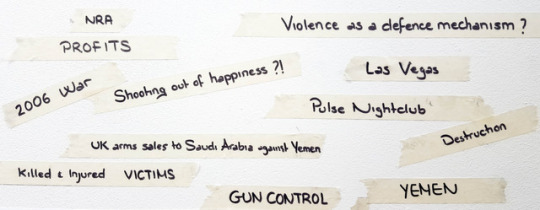
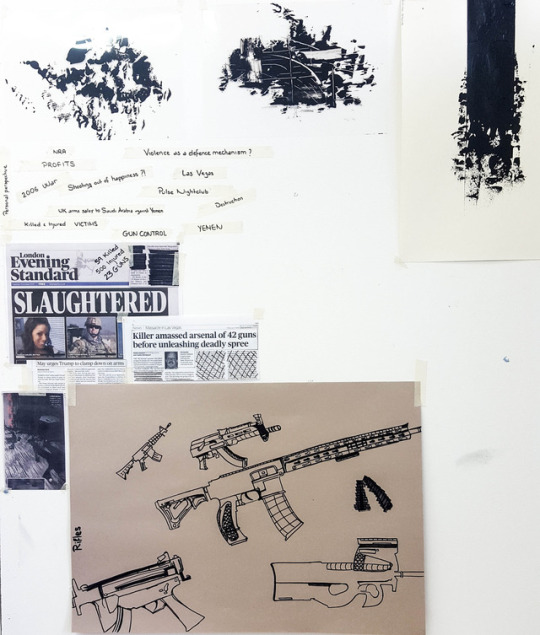
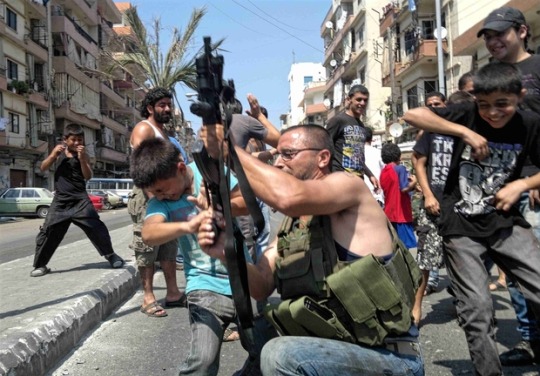
Thursday, 5th October 2017 - Divisive Debates
Workshop 1 (CW1.1) - Contemporary contexts~
Initial ideas and brain storm
One issue that has caught my attention over the years is the idea of arms (in general), and with the calamities unfolding in these recent years, I grew even more interested in using this platform to raise awareness and actively send a clear message. Pursuing the idea of arms for this brief inevitably stems from living through a war in 2006; although one might feel like it hasn’t affected them, the images of destruction and sounds of weapons will probably linger forever. The combination of politics, mental illnesses, or just bad intentions (human behaviour) with weapons over the years seems to have done more bad than good with the events of the ‘Pulse Nightclub’ (49 killed, 58 injured), the ongoing conflict in Syria, and most recently ‘Las Vegas’ (59 killed, 500 injured) and the UK’s arms sales to Saudi Arabia against Yemen.
I first started looking up articles about the mass shootings that have happened in America and the talks about gun control. A lot of talks about gun control fell through with Obama failing to pass the law and Trump avoiding the topic (his twitter.., “We’ll talk about that later”, “we’ll be talking about gun laws as time goes by”), the NRA refusing gun control (well, they’re making profit too) and ‘the easy availability of weapons due to the second amendment to the US constitution, even minor attempts at gun control have proven political impossible in Congress’. Although people are free to own a gun and they may argue that they “need” a number of them, for security-protection-safety purposes (a major hazard for defence??), certain measures and background checks are rather important at this point.
https://www.theguardian.com/us-news/2017/oct/03/donald-trump-gun-control-discuss-las-vegas
https://www.theguardian.com/us-news/2017/oct/08/nra-lapierre-gun-control
https://www.cnbc.com/2016/06/29/gun-control-isnt-the-answer-we-already-know-how-to-stop-the-violence-commentary.html
http://insider.foxnews.com/2017/10/08/judge-jeanine-dont-blame-all-muslims-terrorists-dont-blame-all-gun-owners-las-vegas
Besides America, the use of weapons are more common than we may think. For example, in parts of the Middle East (personally experienced in Lebanon) everyone owns a weapon; from small guns and pistols to assault rifles and if they wanted to, even military arms can be bought. They shoot in the air for happiness and celebrations, at each other over arguments and after simple family disputes.
http://www.middleeasteye.net/news/lebanon-problem-gun-fire-celebration-civil-war-campaign-hezbollah-saad-hariri-1858917291
However, what struck me the most was the situation in Yemen, and mostly the lack of media coverage. The UK arms sales to Saudi Arabia were deemed lawful but are they ethically/morally? The ‘CAAT (Campaign Against Arms Trade) found £7.9bn worth of arms sold to countries on the human rights priority list, which is maintained by the Foreign Office and includes countries judged by the FCO to have "the worst, or greatest number of, human rights violations’, with Saudi Arabia being the biggest arms client after intervening in the civil war in Yemen (at least 10,000 have been killed and 3 MILLION displaced). It was claimed that these UK-made weapons have been used against civilians (’UK bombs sold to Saudi Arabia contributed to ‘81 unlawful attacks in Yemen’’), but who is affected the most besides the children? ‘..comes at the cost of thousands of children who have been killed, injured, and starved by a conflict that this trade has helped sustain’.
https://www.theguardian.com/world/2017/jul/23/uk-arms-sales-to-saudis-continued-after-airstrike-on-yemen-funeral
http://www.theweek.co.uk/checked-out/86700/the-truth-about-uk-arms-sales-to-saudi-arabia
http://www.aljazeera.com/news/2017/09/uk-firms-huge-profits-arm-sales-saudi-arabia-170919055235624.html
My action plan is to use this brief to shed light on the ‘Forgotten War’, the media silence, and the effect it has on the children; ‘UNICEF reports that 1.5 million children are currently malnourished in the country, 370,000 of them severely. On top of this, 178 schools have been attacked, according to data collected by the Yemen Post’.
http://edition.cnn.com/2016/10/06/middleeast/yemen-conflict/index.html
https://www.theguardian.com/commentisfree/2015/oct/26/yemen-war-journalists-silenced-conflict-reporters-activists-abduction-torture
http://www.aljazeera.com/programmes/listeningpost/2016/09/yemen-war-ongoing-media-divide-160904085423569.html
0 notes
Link
For all the Russia-related chatter coming from Washington of late, United States policy towards the Kremlin has been difficult to discern. But while much of official Washington and American media focus on the politically charged investigation of alleged Russian meddlingin the 2016 U.S. presidential election, Moscow isnt standing still but rather capitalizing on the distraction. With all eyes on U.S. President Donald Trump, Russian President Vladimir Putin is advancing his foreign policy agenda on multiple fronts, especially in the Middle East.
For Russians, the move makes sense. What was once hailed as a Putin-Trump bromance is now far from certain, and the possibility of a productive relaunch for bilateral relations seems increasingly unlikely. In response, Putin is looking elsewhere to solidify Russias place in the world order.
Russians remain confused and concerned about potential U.S. policy. Russians are confused by what they see as contradictory positions from the president himself and his top advisers on Russia-related issues. While President Trump has tweeted and commented publicly about his desire to improve relations with Moscow both before and after his inauguration, he has appointed top cabinet officials and advisers who do not appear to share that view. Moreover, following meetings with Ukrainian and European politicians, the president himself declared his commitment to keeping pressure on Russia until it stops occupying Ukrainian territory, including Crimea.
Moscow is toughening its own geopolitical position in regions where the U.S. and Russia have traditionally jockeyed for influence.
In their skepticism toward the likelihood of a new path forward with America, Russians note the consistently hawkish tone from both parties in Congress, whose attitudes Kremlin spokesmen have decried as McCarthyist. They recognize that under the current circumstances, the U.S. Senate is unlikely to confirm any Trump nominee perceived as supporting improved relations with Russia. Likewise, prominent executive branch appointees have spoken out sharply against Russia over the past two months, including U.N. Ambassador Nikki Haley, who urged, we should never trust Russia, and Secretary of Defense James Mattis, who poured cold water on the idea of U.S.-Russian military cooperation. Even the president appeared to reject an overture from Putin during their phone call in January, when Putin proposed to open discussions on a follow-up to the New START arms control agreement, and Trump dismissed it as a bad deal that favored Russia.
Given this, top Russian officials and analysts now assume that the Trump administration will be at best totally hemmed in on Russia policy, and will at worst come to agree with the hawkish bipartisan majority in Washington. Anticipating no further positive initiatives from the U.S. side, Moscow is toughening its own geopolitical position, especially in regions where the U.S. and Russia have traditionally jockeyed for influence. While Russia will keep up the pressure on its immediate neighbors, especially Ukraine, and may seek to shape favorable outcomes in the upcoming French and German elections, the Middle East looks increasingly like an open field for Russias foreign policy ambitions.
VASILY MAXIMOV via Getty Images
General Khalifa Haftar, pictured in Moscow, is aiming to establish a military regime in Libya and is backed by Russia.
Thanks to Russias now 18-month-old military intervention in Syria, Syrian President Bashar Assad is firmly back in control of Aleppo and most of the countrys population centers. With Iran and Hezbollah providing ground forces and Russia supplying air support, Assad is poised to pursue his declared goal of regaining every inch of Syrian territory. Russia is now both a major military power broker and the indispensable facilitator for any future efforts to manage and contain the conflict diplomatically.
Recognizing the Wests indifferent response to the Libyan civil war, Russia has backed Marshal Khalifa Haftar, a former Gaddafi loyalist turned dissident who lived for two decades in the United States and opposes Libyas U.N.-backed government. With Russian support, Haftar and his military forces based in Libyas east may be poised to take over the country and establish a military-led regime with close ties to its Russian patrons. Late last year, he traveled to Moscow for a meeting with Russian Foreign Minister Sergei Lavrov, and in January went aboard the Russian flagship Admiral Kuznetsov for a secure conference call with Russian Defense Minister Sergei Shoigu. If Haftar prevails, Moscow may be the geopolitical beneficiary of Washingtons failure to adequately prepare for post-Gaddafi Libya, which former U.S. President Barack Obama has called his worst mistake.
Moscow may be the beneficiary of Washingtons failure to adequately prepare for post-Gaddafi Libya.
Russias influence may be growing in the space between Libya and Syria as well the Egyptians have contracted with Russias state nuclear energy giant Rosatom to build a power plant at Dabaa on the Mediterranean coast.
Such a project suggests closer ties not only in the billions of dollars required to finance construction, but also in light of multi-year maintenance and security contracts to be provided by Russian firms. Russia also continues to expand arms sales with Egypt one of the worlds top arms markets and still a recipient of over $1 billion in U.S. security assistance. While Egypt is unlikely to downgrade ties with Washington, it clearly sees no disadvantage in cozying up to Moscow at the same time.
And as Egypt begins to strengthen its relationship with Moscow, Putin and his Russian military have not wasted any time in using the new friendship, with Russian special forces apparently operating out of a base in western Egypt, ostensibly to support operations in Libya.
Anadolu Agency via Getty Images
Russia has included Turkey in consultations on Syria, even while excluding the U.S.
Perhaps the most consequential cases to watch are Russias relations with the two non-Arab military powers in the eastern Mediterranean, Turkey and Israel, which are both longstanding U.S. allies. Despite the downing of a Russian jet by Turkey in late 2015 and the murder of Russian Ambassador Andrei Karlovin Ankara last December, Putin and Turkish President Recep Tayyip Erdogan have maintained an apparently close relationship. Russia has included Turkey in consultations on Syria, even while excluding the U.S., and it has carefully avoided provoking Turkey over the Kurdish question, while the U.S.-led coalition makes common cause with Kurdish fighters in Syria.
Russias relations with Israel remain fraught over the Palestinian issue and Russias ties with Iran, but Israeli Prime Minister Benjamin Netanyahu visited Putin in Moscow this month, and the two reportedly speak regularly by phone. With both Russian and Israeli jets in the skies over Syria, direct dialogue is indispensable. But Israel also views close ties with Moscow as necessary to blunt further sales of sophisticated Russian weaponry to Iran, like the S-300 air defense systems that Moscow delivered late last year. For Russia, Israel is a source of investment and high technology unavailable from Europe thanks to sanctions, and with the added appeal of a large Russian-speaking population in Israel itself.
So while Americans muddle through the Trump-Russia investigations, Russians have abandoned hopes of a new reset and doubled down on their assertive role internationally. In the Middle East especially, Washingtons failure to develop a comprehensive policy for engaging, deterring and balancing Kremlin influence is likely to have lasting consequences. From Tripoli to Tehran, Russias military, political and economic clout is growing, raising the prospect for the first time in half a century that the United States will be forced play second fiddle to another world power in the Middle East.
Read more: http://ift.tt/2o2WtRN
The post While Washington Investigates Russian Meddling, Moscow Is Expanding Its Global Influence appeared first on MavWrek Marketing by Jason
http://ift.tt/2nzP3ct
0 notes